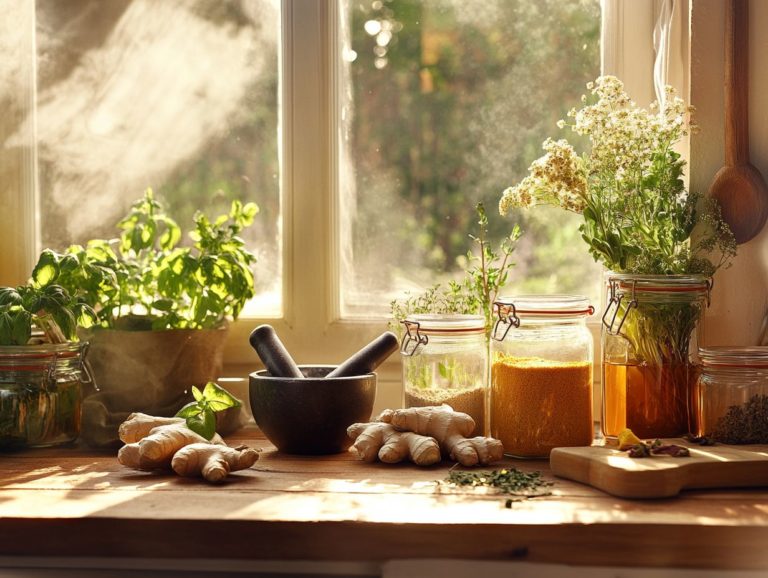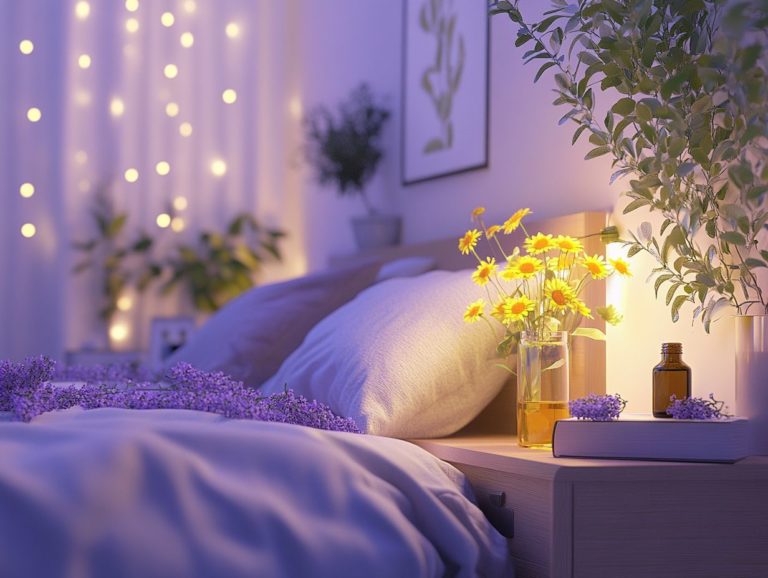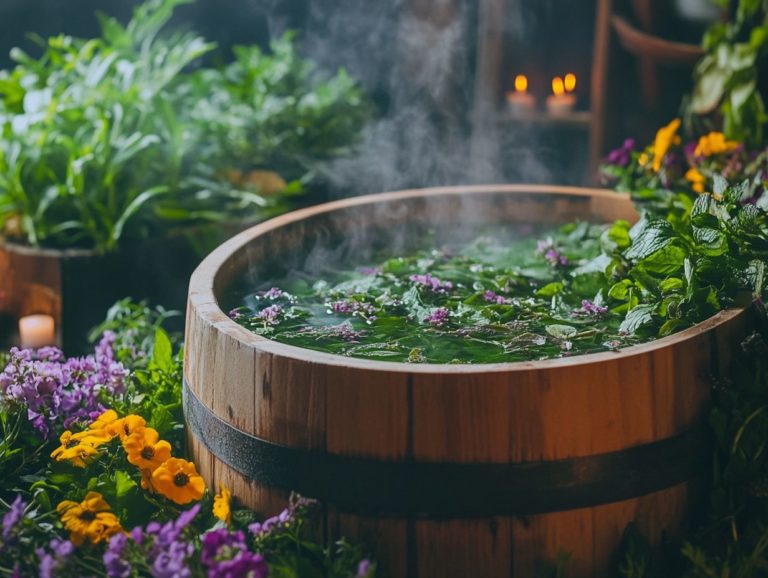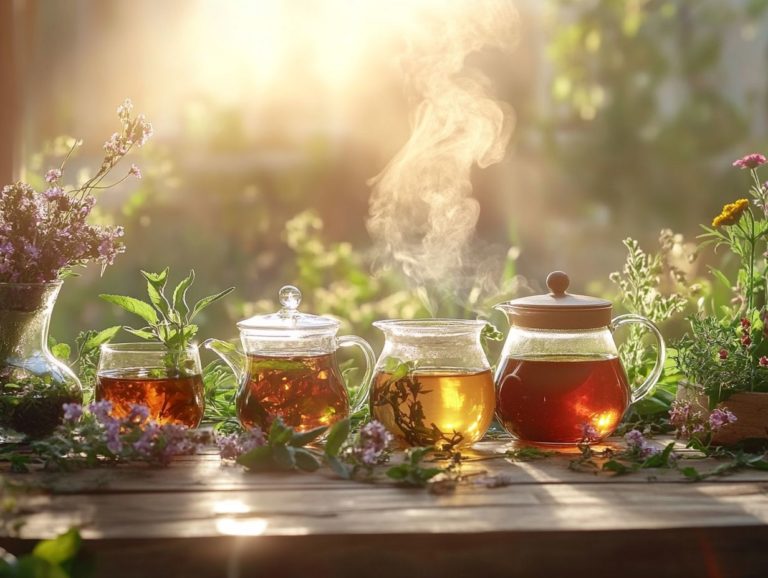5 Tips for Using Aromatherapy for Anxiety
Anxiety can often feel like an insurmountable wave, yet nature provides a serene antidote through aromatherapy.
This guide reveals five practical tips for harnessing the calming essence of essential oils. It will guide you through selecting the perfect scents and integrating them into your daily life.
We ll explore how aromatherapy works, the potential benefits it offers for alleviating anxiety, and essential precautions to consider.
Whether you re new to essential oils or looking to enhance your existing routine, these insights will empower you to cultivate a more tranquil and harmonious environment.
Contents
Key Takeaways:
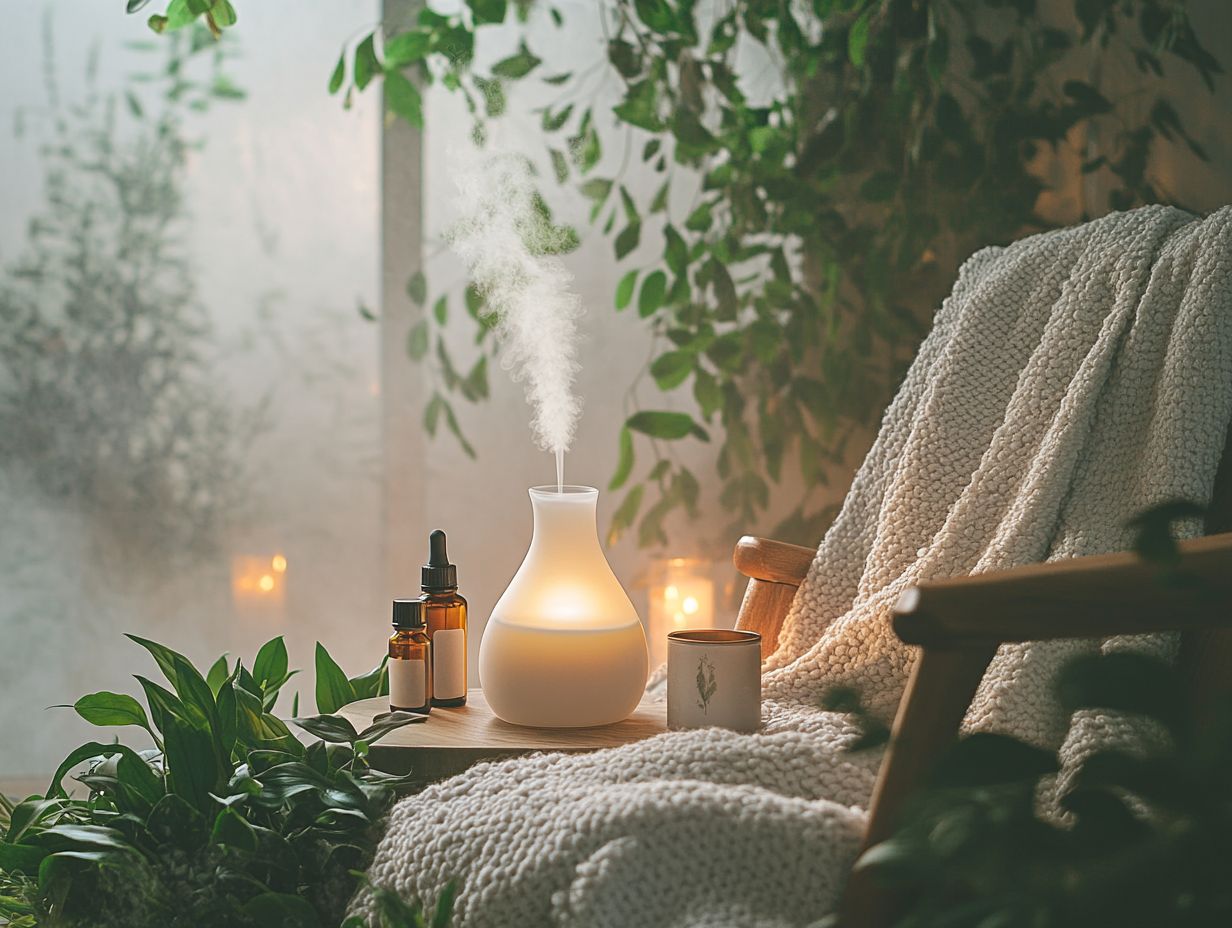
- Choose the right essential oils for anxiety relief, such as lavender, chamomile, or bergamot, to enhance your stress relief.
- Use a diffuser or inhaler to disperse the oils and breathe in their calming scents.
- Incorporate deep breathing techniques with aromatherapy to further relax and reduce anxiety.
1. Choose the Right Essential Oils
Choosing the right essential oils is vital for effective aromatherapy, especially when seeking stress relief and emotional well-being. Oils like lavender, geranium, and chamomile are well known for their calming effects on anxiety and mood enhancement.
These oils not only offer soothing aromas but also have unique properties that can significantly impact your emotional health. For example, research indicates that lavender essential oil can reduce anxiety levels and improve sleep quality due to its sedative effects. Similarly, geranium oil is linked to hormone balance and mood upliftment, helping you unwind more easily.
Chamomile, often enjoyed as tea, also shows great promise in its oil form by promoting relaxation and enhancing sleep patterns scientific studies support these claims. Keep in mind that applying essential oils directly to your skin can cause irritation; therefore, using carrier oils like jojoba or sweet almond oil is essential for safe application and maximizing the benefits.
2. Use a Diffuser or Inhaler
Using a diffuser or inhaler can elevate your aromatherapy experience. These tools allow the calming effects of essential oils to fill your space and promote stress relief, especially if you re dealing with anxiety disorders.
These tools come in various forms, including ultrasonic diffusers, nebulizing diffusers, and inhalers, each providing a unique method of dispersing oils. For instance, ultrasonic diffusers break essential oils into ultra-fine particles, creating a soothing mist. In contrast, nebulizing diffusers release pure concentrated oils, producing a more intense aroma. Inhalers are portable, making them perfect for staying calm on the go.
To maximize their effects, consider blending compatible oils like lavender and chamomile to create a powerful mix that enhances relaxation. Practicing mindful inhalation techniques taking deep, slow breaths can further boost your emotional well-being, transforming the aromatherapy experience into something truly enriching.
3. Practice Deep Breathing Techniques
Adding deep breathing techniques to your aromatherapy routine can elevate your stress relief experience. This creates a serene atmosphere that enhances both mental health and emotional well-being, especially when combined with calming essential oils.
By aligning your inhalation with the gentle scents of lavender or eucalyptus, you ground yourself in the moment while stimulating your body s relaxation response. Techniques like diaphragmatic breathing focusing on deepening your breath and visualizing tension melting away with each exhale can significantly lower your heart rate and reduce cortisol levels associated with anxiety.
As those soothing scents blend with your controlled breathing, you ll likely notice a positive shift in your mood, fostering a profound sense of peace and clarity. This harmonious combination not only provides immediate stress relief but also nurtures a positive mindset, enhancing your overall quality of life.
4. Incorporate Aromatherapy into Your Daily Routine
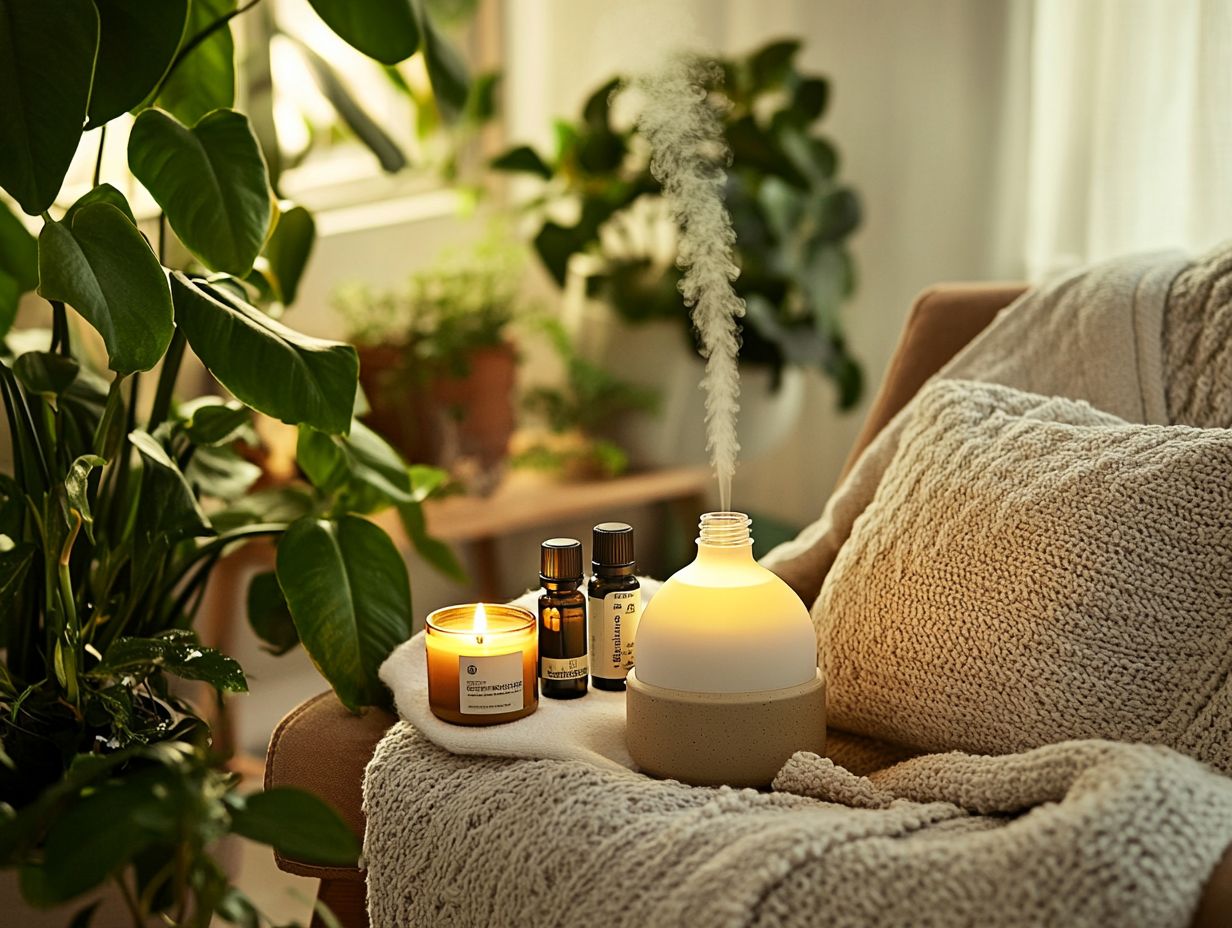
Incorporating aromatherapy into your daily routine can significantly elevate your quality of life. It offers a steady stream of stress relief and emotional support through the careful use of essential oils designed specifically for your unique needs, such as geranium or jasmine.
To get started, think about adding a few drops of calming lavender or refreshing citrus oils to your morning shower. This simple step can transform your shower into a revitalizing ritual that sets an uplifting tone for your day.
During your work hours, diffusing essential oils like peppermint or citrus can enhance focus and productivity. This creates an invigorating environment that encourages creativity while minimizing mental fatigue.
As evening approaches, try using oils like chamomile or bergamot in a diffuser or during a soothing bath. This can help you unwind and prepare both your mind and body for a restful night s sleep.
Over time, these practices provide immediate relief and foster long-lasting emotional resilience and enhanced mental clarity, enabling you to tackle life s challenges with greater ease.
5. Seek Professional Guidance
Seeking professional guidance from a knowledgeable healthcare provider in aromatherapy can significantly enhance your approach to additional treatment options, specifically tailored to address your unique mental health concerns, such as managing stress and anxiety.
This consultation becomes critical if you have pre-existing health conditions. By working alongside a qualified professional, you can identify any potential interactions between essential oils and your current medications.
Healthcare providers can offer valuable insights into the most suitable essential oils for your specific health scenarios. This proactive step cultivates a safer experience and maximizes the effectiveness of the essential oils, fostering a more balanced and harmonious approach to your overall wellness.
What Is Aromatherapy and How Does It Work?
Aromatherapy stands as a natural healing method that harnesses the therapeutic properties of essential oils to enhance both physical and emotional well-being. Scientific research increasingly supports its effectiveness in improving mental health by alleviating stress and anxiety.
This practice traces its roots back to ancient civilizations, including those in Egypt and China. It has undergone considerable evolution through the centuries. You ll find various essential oils, such as lavender, eucalyptus, and peppermint, each offering unique therapeutic benefits from promoting relaxation to providing respiratory relief.
When you inhale or apply these oils, they interact with the body’s limbic system, which controls emotions, triggering emotional responses and influencing mood. Recent scientific studies have started to validate the anecdotal claims surrounding these oils, diving into their mechanisms and showcasing their potential to enhance overall wellness and quality of life.
As the body of scientific research expands, it becomes increasingly clear that incorporating aromatherapy into modern health practices can play a significant role in nurturing both body and mind. This provides a natural treatment for anxiety and depression.
What Are the Best Essential Oils for Anxiety?
The best essential oils for anxiety include lavender, chamomile, and bergamot. Each is celebrated for its calming effects and ability to alleviate stress. These oils are perfect for anyone seeking natural treatment options.
Not only do they elevate your mood, but they also cultivate a sense of peace amid the chaos of modern life. Take lavender essential oil, for example; it’s well-known for enhancing sleep quality and promoting relaxation. You can easily enjoy its benefits through methods like diffusion or applying it topically. Just remember to dilute it with a carrier oil.
Chamomile, often enjoyed as a soothing tea, also shines in the realm of aromatherapy. It offers properties that calm anxious minds. Then there’s bergamot, with its refreshing citrusy aroma. It’s often found in massage oils or baths. Studies have even pointed out its potential to reduce anxiety levels and boost overall emotional well-being.
Incorporating these essential oils into your routine could be a game-changer for your mental wellness, especially when supported by a healthcare provider.
How Can Aromatherapy Help with Anxiety?
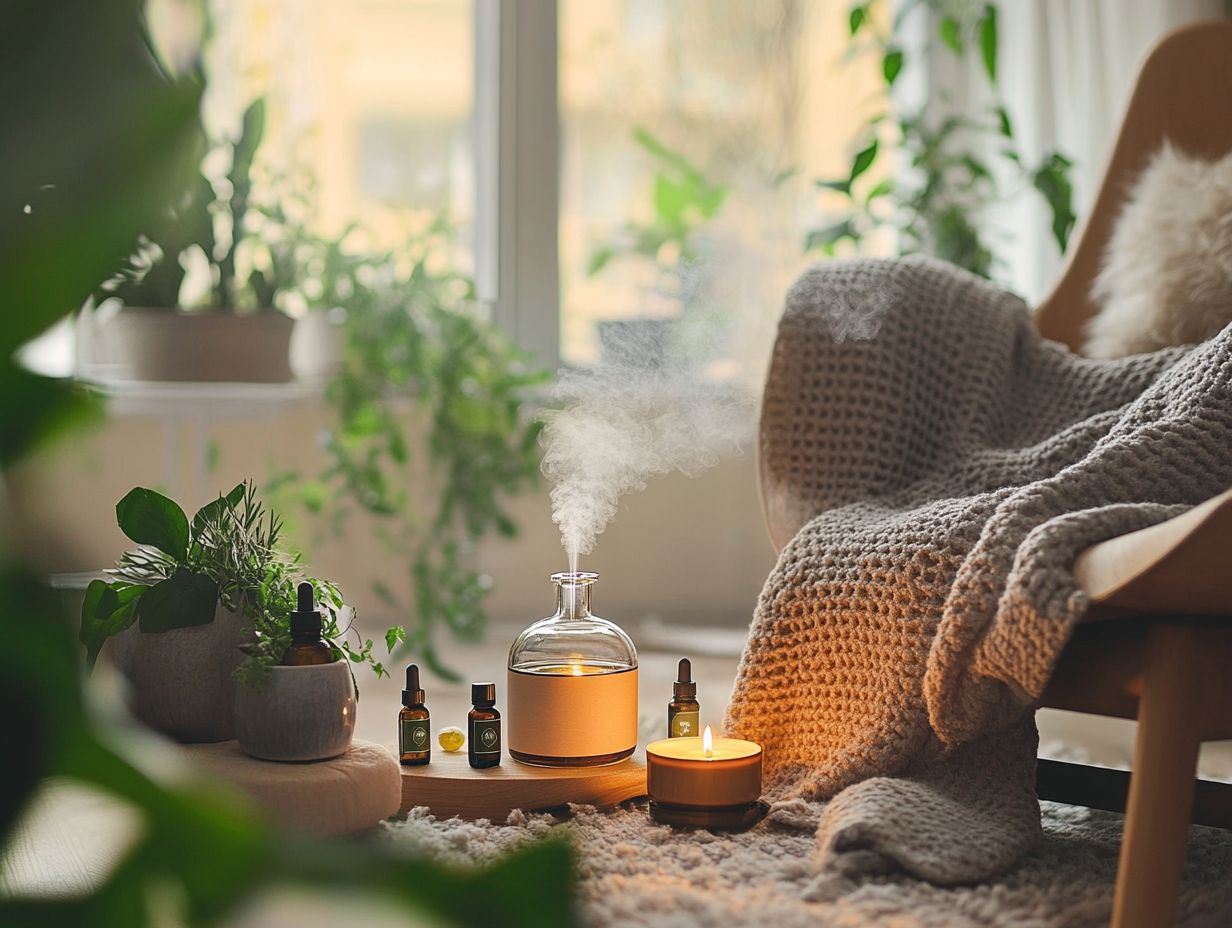
Aromatherapy can significantly benefit your anxiety. By harnessing specific essential oils, you can find stress relief, promote relaxation, and enhance your overall mental well-being through natural, therapeutic means.
These oils work their magic by engaging the part of your brain that processes smells, which is intricately linked to the brain’s limbic system home to your emotions and memories. Just by inhaling soothing scents like lavender or chamomile, you may notice a delightful dip in cortisol levels, ushering in a calmer state of mind.
To fully unleash their potential, consider various applications:
- Diffusing oils in a room
- Enjoying a relaxing massage with them
- Indulging in a luxurious bath ritual
Techniques like deep breathing, paired with these enchanting aromas, create an immersive experience that elevates relaxation and helps you regain a sense of control in the face of anxiety.
Are There Any Precautions to Take When Using Aromatherapy for Anxiety?
While using essential oils, it’s essential to take certain precautions. Consulting with a healthcare provider will ensure that your practices are safe and effective, tailored specifically to your health needs.
Before you embark on this aromatic journey, understanding potential side effects such as skin irritation, allergic reactions, or respiratory issues is vital. Be aware that contraindications may arise, especially for pregnant individuals, those with pre-existing health conditions, or anyone taking specific medications.
To mitigate risks, follow these steps for a patch test with any new oil:
- Choose a small area of skin.
- Apply a diluted drop of the oil.
- Wait 24 hours to check for reactions.
Using proper carrier oils is crucial for diluting the potency of the essential oils and minimizing adverse reactions. This thoughtful approach not only fosters a safe experience but also maximizes the calming effects that aromatherapy is designed to provide.
What Are Some Other Ways to Use Aromatherapy for Anxiety?
Beyond diffusing essential oils, you have a wealth of effective strategies for leveraging aromatherapy to alleviate anxiety. Techniques such as inhalation and massage therapy each offer unique benefits, enhancing your relaxation and emotional well-being.
When you apply essential oils topically, blending them with carrier oils and massaging them into your skin stimulates your senses and fosters a profound sense of calm. Imagine sinking into a warm bath infused with soothing oils, allowing your body and mind to unwind. This transforms your bathing ritual into a sanctuary of peace.
During meditation, inhaling these fragrant oils can elevate your focus and tranquility. This makes it much easier to cast aside the stresses of the day. The beauty of essential oils lies in their versatility; you can tailor them to fit your individual preferences, creating personalized rituals that help you manage anxiety effectively.
Can Aromatherapy Be Used as a Standalone Treatment for Anxiety?
Aromatherapy can be a valuable ally in managing anxiety. It’s crucial to view it as part of a broader complementary medicine approach rather than relying on it as a standalone treatment. For those looking for options, using aromatherapy to calm anxious pets can be especially helpful, particularly for more severe anxiety disorders that may require additional health care support.
This holistic approach includes various therapies, such as cognitive behavioral therapy, mindfulness techniques, and physical exercise. These can amplify the benefits of aromatherapy. By collaborating with healthcare providers, you can receive personalized guidance that seamlessly integrates these modalities into a tailored treatment plan.
It s essential to understand that the calming aromas of essential oils like lavender or chamomile can provide quick relief! When combined with professional support and other therapeutic strategies, you can significantly enhance their overall effectiveness in reducing anxiety. This thoughtful integration promotes a more balanced and comprehensive healing experience and encourages the use of popular brands like Young Living for high-quality oils.
Frequently Asked Questions
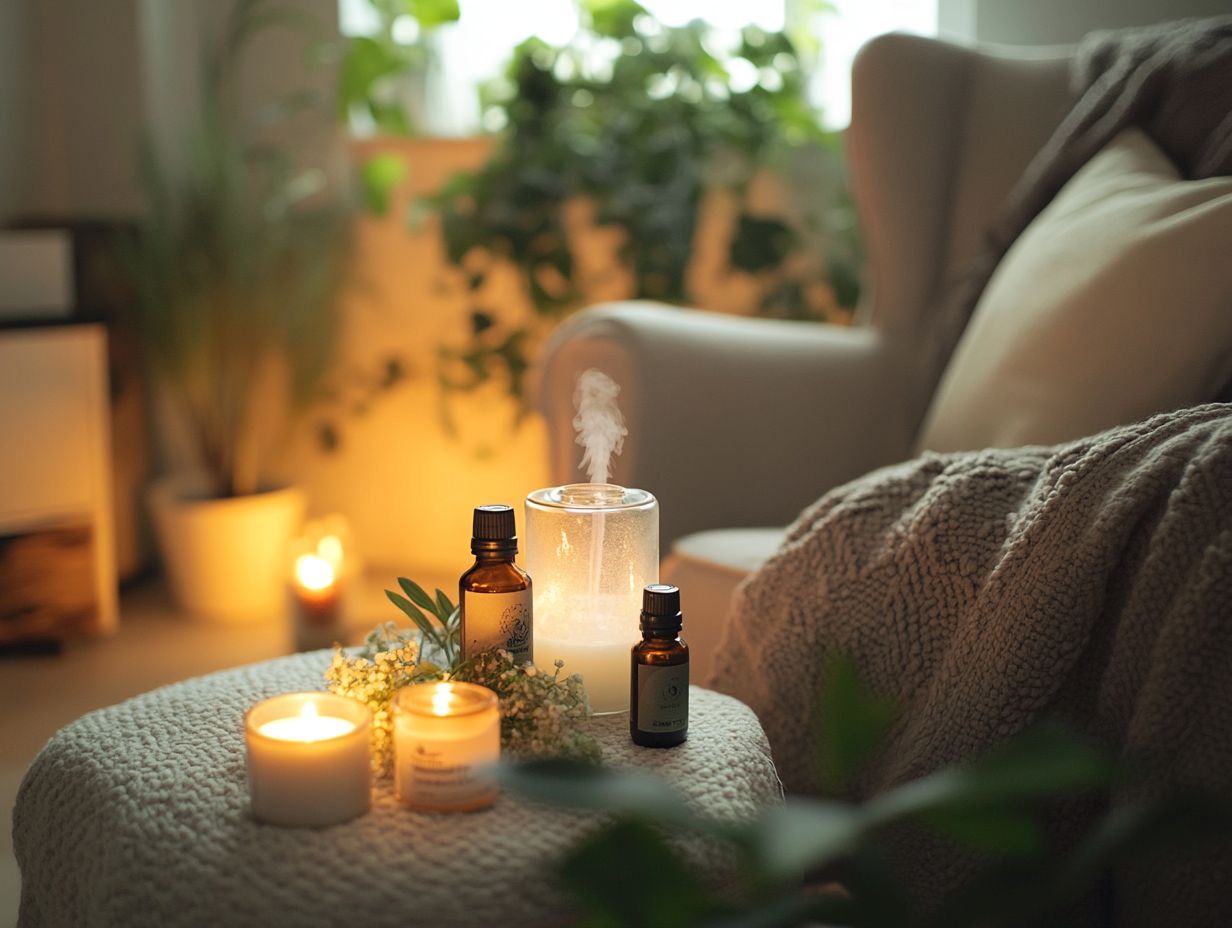
What is aromatherapy?
Aromatherapy is a way to heal using natural oils extracted from plants to improve physical, emotional, and mental well-being.
How can aromatherapy help with anxiety?
Aromatherapy calms the mind and body, making it an effective tool for managing anxiety.
What are some essential oils that are beneficial for anxiety?
- Lavender
- Chamomile
- Bergamot
- Ylang ylang
- Frankincense
How should I use essential oils for anxiety?
There are a few different ways to use essential oils for anxiety, such as inhaling them, applying them topically, or using them in a diffuser. Choose the method that works best for you.
Are there any precautions to take when using aromatherapy for anxiety?
It is important to dilute essential oils properly before applying them to the skin, as some oils may cause irritation. Always do a patch test before using a new oil. Consult with a healthcare professional if you have any underlying health conditions or are pregnant.
Can aromatherapy be used alongside other anxiety treatments?
Yes, aromatherapy can be used as a complementary therapy alongside other treatments for anxiety, such as therapy or medication. However, always consult with a healthcare professional before incorporating aromatherapy into your treatment plan.
In summary, aromatherapy can be an effective part of managing anxiety when used alongside other treatments and personalized healthcare support. Consider essential oils as a natural anxiety solution and consult with a healthcare provider to find the best approach for you.

